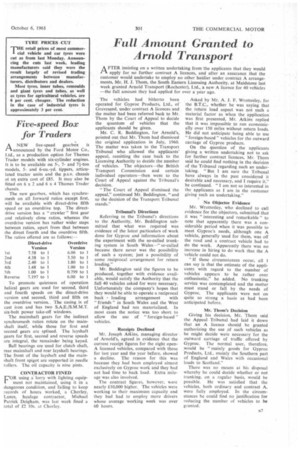Full Amount Granted to Arnold Transport
Page 41

If you've noticed an error in this article please click here to report it so we can fix it.
AFTER insisting on a written undertaking from the applicants that they would apply for no further contract A licences, and after an assurance that the customer would undertake to employ no other haulier under contract A arrangements, Mr. H. J. Thom, the South Eastern Licensing Authority, at Maidstone last week granted Arnold Transport (Rochester), Ltd., a new A licence for 40 vehicles —the full amount they had applied for over a year ago.
The vehicles had hitherto been operated for Gyproc Products, Ltd., of Gravesend, under contract A licences and the matter had been referred back to Mr. Thom by the Court of Appeal to decide the quantum of vehicles that the applicants should be given.
Mr. C. R. Beddington, for Arnold's, pointed out that Mr. Thom had dismissed the original application in July, 1960. The matter was taken to the Transport Tribunal who allowed the applicants' appeal, remitting the case back to the Licensing Authority to decide the number of vehicles. The objectors—the British Transport Commission and certain individual operators—then went to the Court of Appeal against the Tribunal's decision.
" The Court of Appeal dismissed the appeal," continued Mr. Beddington. "and so the decision of the Transport Tribunal stands."
Tribunal's Directions Referring to the Tribunal's directions to the Authority, Mr. Beddington submitted that what was required was evidence of the latest particulars of work done for Gyproc and information about the experiment with the so-called trunking system in South Wales—" so-called because there never was the possibility of such a system; just a possibility of some reciprocal arrangement for return loading."
Mr. Beddington said the figures to be produced, together with evidence available, would satisfy the Authority that the full 40 vehicles asked for were necessary. Unfortunately the company's hopes that they would be able to operate a reciprocal back loading arrangement with " friends " in South Wales and the West of England had not materialized. In most cases the notice was too short to allow the use of " foreign-based " vehicles.
Receipts Declined Mr. Joseph Atkins, managing director of Arnold's, agreed in evidence that the current receipt figures for the eight openA licensed vehicles, compared with those for last year and the year before, showed a decline. The reason for this was because they had been employed almost exclusively on Gyproc work and they had not had time to back load. Extra mileage was also involved.
The contract figures, however, were nearly £10,000 higher. The vehicles were working to their maximum capacity and they had had to employ more drivers whose average working week was over 60 hours. Asked by Mr. A. J. F. Wrottesley, for the B.T.C., whether he was saying that the return load aspect was not such a material factor as when the application was first presented, Mr. Atkins replied that it was impossible to run economically over 150 miles without return loads. He did not anticipate being able to use " foreign-based " vehicles for the outward carriage of Gyproc products.
On the question of the applicants giving a written undertaking not to ask for further contract licences, Mr. Thom said he could find nothing in the decision of the Tribunal regarding such an undertaking. "But I am sure the Tribunal have always in the past considered it desirable and necessary, and I require it." he continued. "I am not so interested in the applicants as I am in the customer giving such an undertaking."
No Objector Evidence Mr. Wrottesley, who declined to call evidence for the objectors, submitted that it was "interesting and remarkable to note that apparently there was a considerable period when it was possible to meet Gyproc's needs, although one A vehicle, generally used for them, was off the road and a contract vehicle had to do the work. Apparently there was no increase in hiring to do work that the A vehicle could not do.
"If these circumstances occur, all I can say is that the estimate of the applicants with regard to the number of vehicles appears to be rather over enthusiastic," he added. No trunking service was contemplated and the matter must stand or fall by the needs of Gyproc. The applicants were not on quite so strong a basis as had been anticipated before.
Mr. Thom's Decision
Giving his decision, Mr. Thom said the Appeal Tribunal had laid it down that an A licence should be granted authorizing the use of such vehicles as he might decide were necessary for the outward carriage of traffic offered by Gyproc. The normal user, therefore, would be "mainly goods for Gyproc Products, Ltd., mainly the Southern part of England and Wales with occasional loads to Scotland."
There was no means at his disposal whereby he could decide whether or not trunking, on a regular basis, would be possible. He was satisfied that the vehicles, both ordinary and contract A, were fully employed. In the circumstances he could find no justification for i.educing the number of vehicles to be granted.




























































































































































